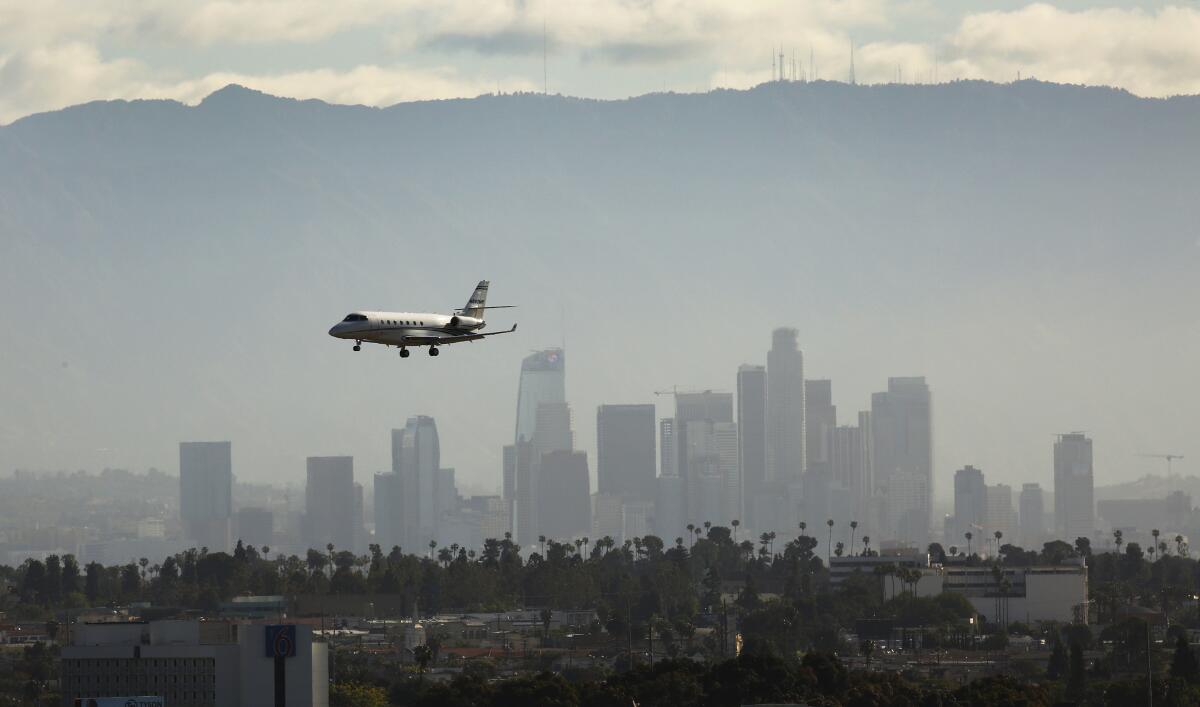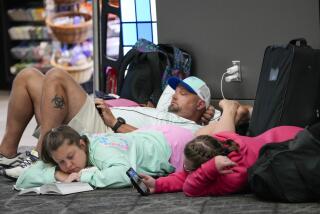5G rollout could impact airplane instruments, airlines warn. That’s not stopping AT&T and Verizon

A struggle between wireless carriers and airlines over the phone industry’s new use of airwaves is set to heat up, possibly in court, as AT&T Inc. and Verizon Communications Inc. forge ahead with their 5G rollout plans.
The carriers vowed Sunday to launch their new 5G services Jan. 5, defying requests from U.S. transportation officials who back claims that the signals might interfere with aircraft electronics. Without intervention from courts or federal agencies, service is about to begin, with potentially unpredictable effects on air travel.
At issue are more than $80 billion worth of airwaves purchased by the wireless carriers last year. These so-called C-band frequencies are near enough to signals used by the radar altimeters on planes to potentially interfere with landings, according to airlines and jet manufacturers. Wireless providers say there’s enough separation.
On Sunday, the wireless carriers, while still going full-throttle toward their 5G launch, said they might create exclusion zones around airports, similar to those used in France. In such places, they would hold off on installing C-band transmitters for six months.
As a condition of the offer, the airline group and the wireless industry would work together toward a solution and not escalate the battle.
“AT&T and especially Verizon paid dearly for their C-band spectrum and are rightfully upset at the fact that the government is essentially trying to renegotiate the deployment,” said John Byrne, an analyst at GlobalData.
The airline group says that if the carriers go ahead with the 5G launch as planned, it could force schedule changes and cancellations that affect “as many as 345,000 passenger flights.”
The fight could go in a variety of directions.
- The airline group could accept the six-month pause and work out network power levels and altimeter equipment safeguards.
- The Federal Aviation Administration could reject the compromise and issue an emergency request to the FCC to delay the 5G launch.
- The FAA or the Transportation Department could file a motion, as early as this week, in court seeking a stay to prevent the launch of the C-band service.
New Street Research analyst Blair Levin, a former lawyer at the FCC, says he’s seen a gradual de-escalation of the conflict in recent weeks, according to a note Monday. For example, the airline industry’s threat of a “massive” shut down of flights has now been quantified at what he estimates is 4%.
The aviation industry has asked the FCC to delay the rollout. If that’s rejected, they’ll go to the courts, Levin said.
“The action will be confusing but we feel confident that the result of all the actions will be, at worst, a nonmaterial short delay,” Levin wrote.
Bloomberg Intelligence analyst Matthew Schettenhelm also sees limited damage to the wireless carriers, according to a note Monday.
“We would view the filing of any lawsuits as efforts to improve leverage in negotiations rather than as severe threats to the carriers’ C-band investments,” Schettenhelm wrote.
The carriers say the C-band rollout is a national priority, citing not only the more than $80 billion paid for the licenses, but also the race with China on 5G and the crucial connection that has proved essential for customers during the COVID-19 pandemic.
Meanwhile, the wireless carriers are facing their own competitive pressure to get C-band 5G service up and running. The airwaves offer the kind of capacity and speeds that can create new revenue from services such as wireless home internet and semiautonomous connected cars.
AT&T and Verizon are also in a desperate race to catch up with T-Mobile US Inc. in the 5G race. T-Mobile has more than a year’s head start on the build-out of these mid-band networks.
Now’s the time to move, said Byrne of GlobalData.
AT&T and Verizon “have concluded that they are in a strong position to push back right now and are in a rare position of alignment on an important issue for both companies,” he said.
Bloomberg writer Alan Levin contributed to this report.
More to Read
Inside the business of entertainment
The Wide Shot brings you news, analysis and insights on everything from streaming wars to production — and what it all means for the future.
You may occasionally receive promotional content from the Los Angeles Times.










